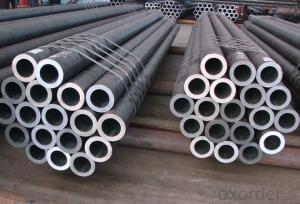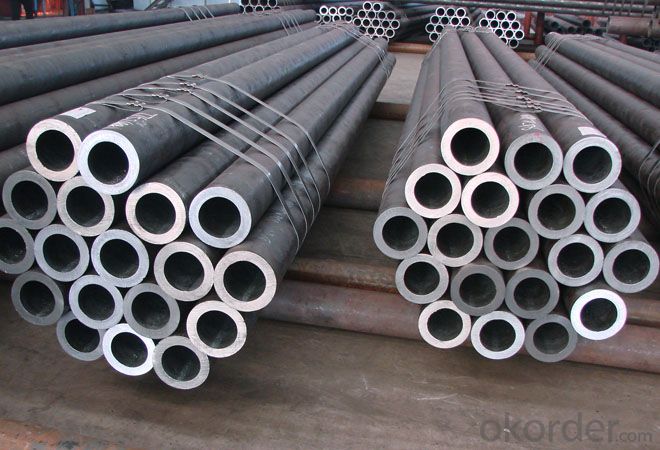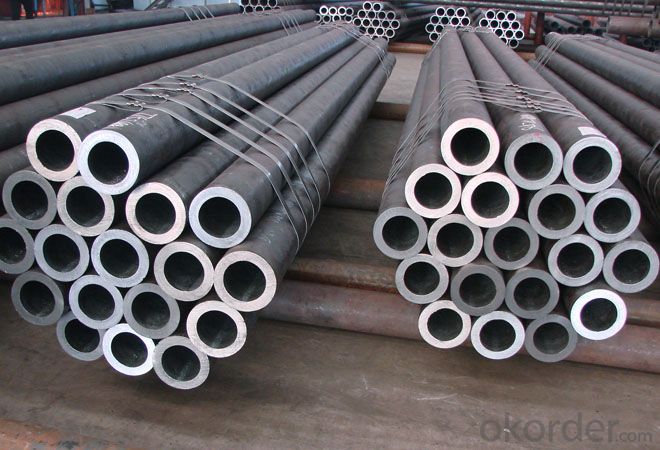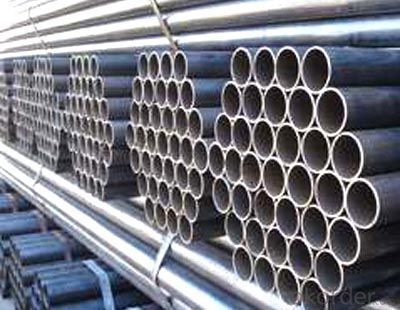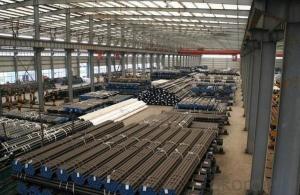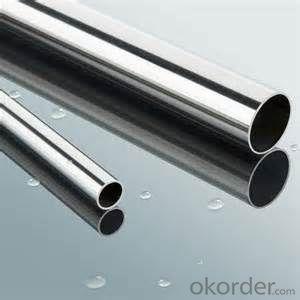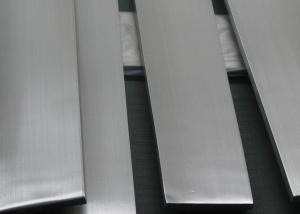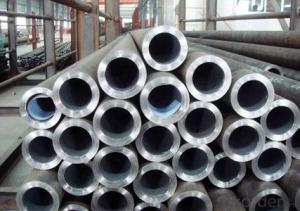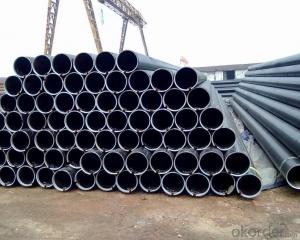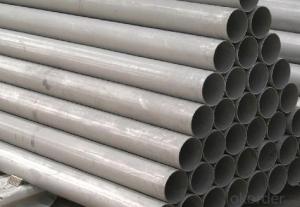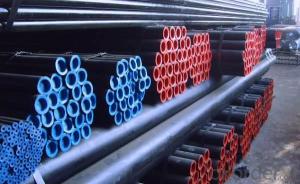Carbon Steel Steamless Pipe With Good Quality
- Loading Port:
- Tianjin
- Payment Terms:
- TT or LC
- Min Order Qty:
- 10 m.t.
- Supply Capability:
- 500 m.t./month
OKorder Service Pledge
OKorder Financial Service
You Might Also Like
1、Structure of Seamless Pipe ASTM A106/53:
Seamless pipe is formed by drawing a solid billet over a piercing rod to create the hollow shell. As the manufacturing process does not include any welding, seamless pipes are perceived to be stronger and more reliable. Historically seamless pipe was regarded as withstanding pressure better than other types, and was often more easily available than welded pipe.
Commodity Name: Seamless steel pipe
Standard: API,GB,ASTM,ASME,DIN
Quality grade: 10#, 20#, A106B, A53B, API 5L B, Q235, Q345, ST37-2, ST 45, ST52.etc.
Dimension: OD: 1/2"-24" WT: 2.5-80mm, SCH10~SCH40~XXL length: 5.8m,6m,8m,9m,12m
application
carbon seamless steel pipes are widely used in gas, water and oil, transpotation;constructions;Bridge,highway,windows of model steel door; building materials;fences;heating facilities Fluid Pipe;conduit pipe,scaffolding pipe.etc.
8.packing and shipment
Packaged in bundles,as per customers' requirements, it can also bepackagesd as beveled ends, typed marking, black painting, plastic caps protection,woven bags packing
For 20" container the max length is 5.8m; For 40" container the max length is 12m. other options are available based on customer requests. Please discuss when placing orders.
2、Main Features of the Seamless Pipe ASTM A106/53:
• High manufacturing accuracy
• High strength
• Small inertia resistance
• Strong heat dissipation ability
• Good visual effect
• Reasonable price
3、Seamless Pipe ASTM A106/53 Specification:
Standard | GB, DIN, ASTM ASTM A106-2006, ASTM A53-2007 |
Grade | 10#-45#, 16Mn 10#, 20#, 45#, 16Mn |
Thickness | 8 - 33 mm |
Section Shape | Round |
Outer Diameter | 133 - 219 mm |
Place of Origin | Shandong, China (Mainland) |
Secondary Or Not | Non-secondary |
Application | Hydraulic Pipe |
Technique | Cold Drawn |
Certification | API |
Surface Treatment | factory state or painted black |
Special Pipe | API Pipe |
Alloy Or Not | Non-alloy |
Length | 5-12M |
Outer Diameter | 21.3-610mm |
Grade | 20#, 45#, Q345, API J55, API K55, API L80, API N80, API P110, A53B |
Standard | ASME, ASTM |
1) Material:20#(ASTM A 106/A53 GRB.API5LGRB,GB),45#,16Mn,10#.
2) Specification range:OD:21.3-610mm,WT:6-70mm,length:6-12m or according to the requirement of clients.
3) Excutive standards:GB,ASME API5L.ASTM A 106/A53,Despite of the above standards,we can also supply seamless steel pipe with standard of DIN,JIS,and so on,and also develop new products according to the requirements of our clients!
4) Surface:black lacquered,varnish coating or galvanized.
5) Ends:Beveled or square cut,plastic capped,painted.
6) Packing:bundles wrapped with strong steel strip,seaworthy packing.
4、Packaging & Delivery
Packaging Details: | seaworthy package,bundles wrapped with strong steel strip |
Delivery Detail: | 15-30days after received 30%TT |
5、FAQ of Seamless Pipe ASTM A106/53:
①How is the quality of your products?
Our products are manufactured strictly according to national and internaional standard, and we take a test
on every pipe before delivered out. If you want see our quality certifications and all kinds of testing report, please just ask us for it.
Guaranteed: If products’ quality don’t accord to discription as we give or the promise before you place order, we promise 100% refund.
②How about price?
Yes, we are factory and be able to give you lowest price below market one, and we have a policy that “ for saving time and absolutely honest business attitude, we quote as lowest as possible for any customer, and discount can be given according to quantity”,if you like bargain and factory price is not low enough as you think, just don’t waste your time.Please trust the quotation we would give you, it is professional one.
③Why should you chose us?
Chose happens because of quality, then price, We can give you both.Additionally, we can also offer professional products inquiry, products knowledge train(for agents), smooth goods delivery, exellent customer solution proposals.Our service formula: good quality+good price+good service=customer’s trust
SGS test is available, customer inspection before shipping is welcome, third party inspection is no problem.
6、Seamless Pipe ASTM A106/53 Images:
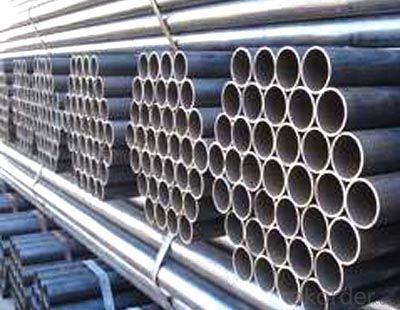
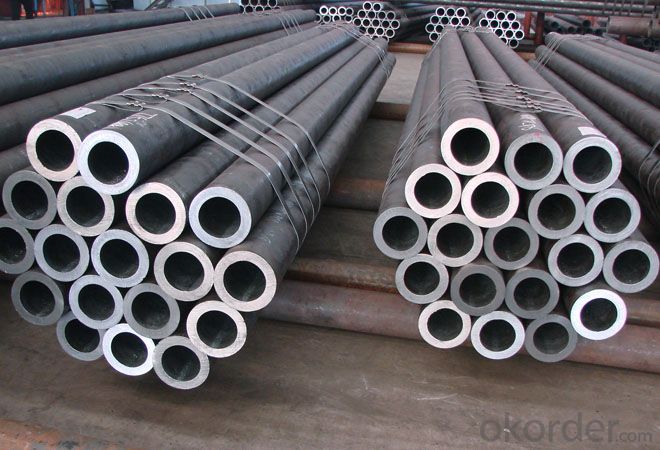
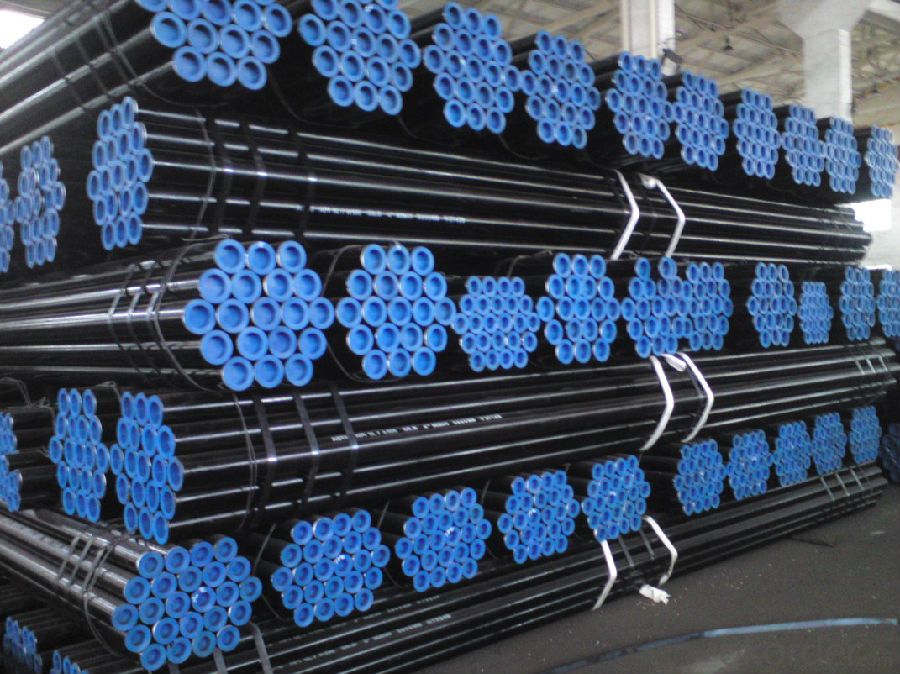
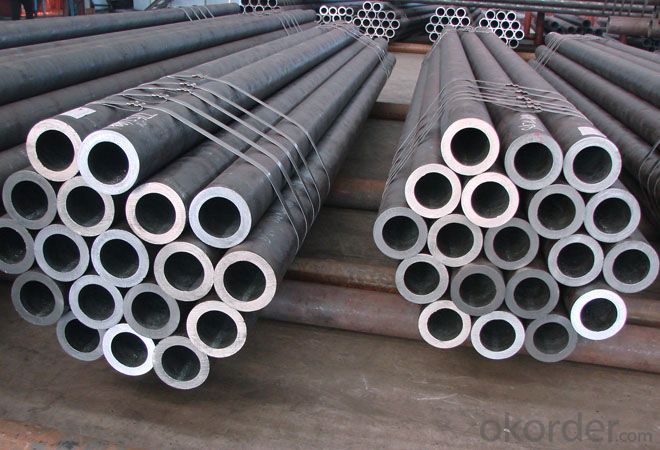
- Q: What are the different types of steel pipe coatings for nuclear power plants?
- There are several types of steel pipe coatings used in nuclear power plants, including epoxy coatings, polyethylene coatings, fusion bonded epoxy coatings, and coal tar enamel coatings. These coatings are applied to steel pipes to provide protection against corrosion, enhance durability, and maintain the integrity of the pipes in the demanding environment of nuclear power plants.
- Q: How do you calculate the pipe flow velocity coefficient for steel pipes?
- The Manning's equation is employed to determine the flow velocity in open channels and pipes, taking into consideration the hydraulic radius, slope, and roughness coefficient of the pipe. By applying this equation, the pipe flow velocity coefficient for steel pipes can be calculated. To ascertain the pipe flow velocity coefficient for steel pipes, the following steps should be followed: 1. Calculate the hydraulic radius (R) of the steel pipe by dividing the cross-sectional area (A) of the pipe by the wetted perimeter (P). The formula to use is R = A/P. 2. Determine the slope (S) of the pipe, which is the change in elevation divided by the length of the pipe. Usually, it is expressed as a ratio or a percentage. 3. Obtain the roughness coefficient (n) of the steel pipe, representing the internal roughness of the pipe. This information can be found in literature or pipe manufacturer specifications, often given in terms of the Manning's roughness coefficient. 4. Insert the values of hydraulic radius (R), slope (S), and roughness coefficient (n) into the Manning's equation: V = (1/n) * R^(2/3) * S^(1/2) where V signifies the flow velocity. 5. Solve the equation for V to calculate the pipe flow velocity coefficient for steel pipes. It is crucial to note that the calculated velocity coefficient may differ depending on specific pipe dimensions, flow conditions, and other factors. Therefore, it is advisable to consult relevant engineering standards or seek guidance from a hydraulic engineer to ensure accurate and reliable calculations for specific applications.
- Q: How to make the magnetic steel, can be like a magnet?
- Of course, not all materials can be magnetized, austenitic stainless steel will not do.
- Q: Are steel pipes resistant to ultraviolet (UV) radiation?
- Ultraviolet (UV) radiation poses a threat to steel pipes as they do not possess inherent resistance. This type of radiation has the potential to induce degradation and discoloration in various materials, including steel. However, the extent of harm inflicted depends on several factors, including steel type, duration and intensity of UV exposure, and the presence of protective coatings or finishes on the pipes. Generally, uncoated steel pipes are more vulnerable to UV damage compared to those treated with protective coatings or finishes. Coatings such as epoxy or polyethylene act as a shield against UV radiation, effectively preventing steel degradation and discoloration. Hence, it becomes crucial to consider the specific application and environment when selecting steel pipes and implementing suitable protective measures to ensure their durability and performance.
- Q: What are the different types of thread connections used in steel pipes?
- The different types of thread connections used in steel pipes include tapered threads such as NPT (National Pipe Thread), BSPT (British Standard Pipe Taper), and API (American Petroleum Institute) threads. There are also parallel threads like BSP (British Standard Pipe) and G (ISO 228-1). These thread connections are used to join and seal steel pipes in various industries and applications.
- Q: How do you calculate the pipe pressure drop for steel pipes?
- To calculate the pressure drop in steel pipes, you can use the Darcy-Weisbach equation, which takes into account factors such as the pipe diameter, length, roughness, and the fluid flow rate. By plugging these variables into the equation, you can determine the pressure drop experienced by the fluid as it flows through the steel pipe.
- Q: What are the thermal properties of steel pipes?
- Steel pipes have excellent thermal properties. They have a high thermal conductivity, which means they can efficiently transfer heat. Additionally, steel pipes have a high melting point, making them suitable for handling high temperatures without any significant deformation or damage.
- Q: Can steel pipes be used for hydraulic systems?
- Yes, steel pipes can be used for hydraulic systems. Steel pipes are commonly used in hydraulic systems due to their high strength, durability, and resistance to high pressure and temperature. They provide reliable performance and are suitable for a wide range of hydraulic applications.
- Q: How do you calculate the weight of steel pipes?
- To calculate the weight of steel pipes, you can use the formula: weight = volume × density. The volume of a steel pipe can be calculated by multiplying its cross-sectional area (πr²) with its length. The density of steel is typically known, or you can refer to a density table. By plugging in these values, you can determine the weight of steel pipes.
- Q: What are the advantages of using steel pipes over other materials like PVC or copper?
- There are several advantages of using steel pipes over other materials like PVC or copper. Firstly, steel pipes have superior strength and durability, making them suitable for high-pressure applications and extreme weather conditions. Secondly, steel pipes have excellent corrosion resistance, ensuring a longer lifespan compared to PVC or copper. Additionally, steel pipes offer better fire resistance, making them safer for certain applications. Lastly, steel pipes have higher thermal conductivity, allowing for efficient heat transfer.
Send your message to us
Carbon Steel Steamless Pipe With Good Quality
- Loading Port:
- Tianjin
- Payment Terms:
- TT or LC
- Min Order Qty:
- 10 m.t.
- Supply Capability:
- 500 m.t./month
OKorder Service Pledge
OKorder Financial Service
Similar products
Hot products
Hot Searches
Related keywords
